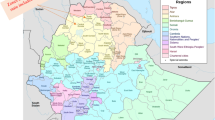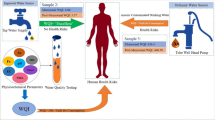Abstract
Securing adequate safe drinking water and proper sanitation is a major challenge facing the developing world. The “Water for Life Decade” emphasizes the importance of upgrading national water quality and sanitation services. This study assessed the domestic water profile in the city of Beirut. Samples were collected from three types of household water sources (municipality, private wells, and vended water bottles) and assessed for their physiochemical and microbiological profile. At the same time, a cross-sectional survey assessing water consumption patterns and the prevalence of water-borne diseases was conducted. The results showed a deficient water quality profile in all three water sources. The measured physiochemical and bacteriological parameters reflected the high frequency of water-borne diseases. Action to secure a safe domestic water supply is essential. The plan should guarantee the protection of water sources, ensure sufficient treatment of domestic water and upgrade the national program for potable water quality control. Periodic quality monitoring and legislating the chaotic water-vending sector are indispensable. Additionally, the deterioration of private well sources by sea and wastewater infiltration necessitates the enforcement of legislation associated with the use and management of private wells. Consumer awareness and active contributions to promote and protect public health are important.





Similar content being viewed by others
References
Acra, A., & Ayoub, G. M. (2001). Indicators of coastal groundwater quality changes induced by seawater inflitation. International Journal of Environmental Studies, 58, 761–769.
Acra, A., Raffoul, Z., & Karahogopian, N. (1983). Long-term investigation of sea water infiltration and ground water quality in Greater Beirut. MESAEP, Proceedings: Second International Meeting on Environmental Pollution in the Mediterranean Region, 6–7 September 1983, Iraklion, Crete.
Al-Safir Newspaper. (2002). Official examinations confirm water pollution. Al-Safir Newspaper, 14 February (in Arabic).
Amery, H. A. (2002). Irrigation planning in Lebanon: Challenges and opportunities. In Ö. Mehmet & H. Biçak (Eds.), Modern and traditional irrigation technologies in the Eastern Mediterranean (Chap. 6). Ottawa, Canada: IDRC 2002 Publication.
APHA—American Public Health Association. (1998). Standard methods for the examination of water and wastewater (20th ed.). Washington, DC.
Basma, S. (2004). Complementary water sources in a selected urban area in Beirut, Lebanon: Public perceptions, regulations and quality. MS thesis, Department of Environmental Health, Faculty of Health Sciences, American University of Beirut, Lebanon.
Bennet, E. B. (1998). Public-private cooperation in the delivery of urban infrastructures services (water and waste). United Nations, Development Program-Public Private Partnerships (UNDP-PPP), Yale.
Carter, R. C., Tyrrel, S. F., & Howsam, P. (1997). The impact and sustainability of water and sanitation programs in developing countries. Journal of the Chartered Institution of Water and Environmental Management, 13, 292–296.
Council of Development and Reconstruction-CDR. (1998). Water supply and waste water report. Available at: www.cdr.gov.lb/indexe (choose a report).
Drever, J. I. (1997). The geochemistry of natural waters: Surface and groundwater environments (3rd ed.). New Jersey, USA: Prentice Hall.
El-Fadel, M., Zeinati, N., & Jamali, D. (2000). Water resources in Lebanon: Characterization, water balance and constrains. Journal of Water Resource Development, 16(4), 619–642.
El-Fadel, M., Maroun, R., Semerjian, S., & Harajli, H. (2003). A health-based socio-economic assessment of drinking water quality: The case of Lebanon. Management of Environmental Quality, 14(3), 353–368.
Gleick, P. H. (1996). Basic water requirements for human activities: Meeting basic needs. Water International, 21, 83–92.
Hinrichsen, D., Robey, B., & Upadhyay, U. D. (1997). Solutions for a water-short world. Population reports, series M, No. 14. Baltimore, MD: Population Information Program, John Hopkins School of Public Health.
Jaber, B. (1997). Water in Lebanon: Problems and solutions. Public lecture given in the Department of Hydrology, Purdue University, Lafayette, USA, April, 1997.
Jurdi, M., Kambris, M., & Basma, S. (2002). Development of drinking water quality control programs: Challenges for sustainability. Journal of Environmental Practice, 4(2), 72–74.
Jurdi, M., Abed Al-Razzzak, M., & Bassma, S. (2003). The introduction of water resources management in Western Asia region. Water Policy, 5(3), 253–268.
Kjellen, M. (2000). Complementary water systems in Dar es Salaam, Tanzania: The case of water vending. Water Resource Development, 16, 143–154.
Korfali, S., & Jurdi, M. (2007). Assessment of domestic water quality: Case study, Beirut, Lebanon. Environmental Monitoring and Assessment, 135, 241–251.
Lababidi, H., Shatela, A., & Acra, A. (1987). The progressive salination of ground water in Beirut, Lebanon. International Journal of Environmental Studies, 30, 203–208.
Makoni, F. S., Manase, G., & Ndamba, J. (2004). Patterns of domestic water use in rural areas of Zimbabwe, gender roles and realities. Physics and Chemistry of the Earth, 29, 1291–1294.
Ministry of Environment—MEO. (2001). Lebanon State of the Environment Report-Water (Chap. 8).
Ministry of Health—MOH. (2000). Compilation of Lebanese epidemiological newsletter. EpiNews 1995–2000.
Palamuleni, L. G. (2002). Effects of sanitation facilities, domestic solid waste disposal and hygiene practices on water quality in Malawi’s urban poor areas: A case study of South Lunzu Township in the city of blan tyre. Physics and Chemistry of the Earth, 27, 845–850.
Pathan, M. D. (1977). Pollutional aspects of water resources in Lebanon (Vol. 1). MS thesis, American University of Beirut, Lebanon.
Saghir, J., Schiffler, M., & Mathewos, W. (2000). Urban water and sanitation in the Middle East and North Africa region: The way forward. Washington, DC: World Bank Publication.
United Nation—UN. (2001). World urbanization prospects. UN Department of Economic and Social Affairs, Population Division.
United Nation—UN. (2003). Water for people, water for life. UN World Water Development Report (WWDR).
United Nations Development Program—UNDP. (1995). Online, available at: www.undp.org.lb/programme/governece/advocacy/hdr97/chp31.pdf.
United States Environmental Protection Agency—USEPA. (2003). National primary drinking water standards, EPA 816-F-03-016. Available at www.epa.gov./safewater.
WHO. (2006). Guidelines for drinking-water quality: First addendum to third edition. Volume 1 Recommendations. Geneva, Switzerland.
WSSD. (2002). A framework for action on water and sanitation. WEHAB Working Group of the World Summit on Sustainable Development, Johannesburg, 2002.
Acknowledgements
This study was supported by the University Research Council, Lebanese American University, under contract nos. URC-c2006-02, URC-F2006-21 and URC-t2007-26 and the Lebanese National Council for Scientific Research (CNRSL).
Author information
Authors and Affiliations
Corresponding author
Rights and permissions
About this article
Cite this article
Korfali, S.I., Jurdi, M. Provision of safe domestic water for the promotion and protection of public health: a case study of the city of Beirut, Lebanon. Environ Geochem Health 31, 283–295 (2009). https://doi.org/10.1007/s10653-008-9218-1
Received:
Revised:
Accepted:
Published:
Issue Date:
DOI: https://doi.org/10.1007/s10653-008-9218-1




